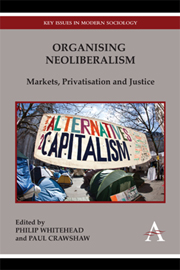Book contents
- Frontmatter
- Contents
- Chapter 1 Introduction: A Preliminary Mapping of the Terrain
- Chapter 2 Neoliberalism and Crime in the United States and the United Kingdom
- Chapter 3 Neoliberalism, Prisons and Probation in the United States and England and Wales
- Chapter 4 The Neoliberal Wings of the ‘Smoke-Breathing Dragon’: The Cigarette Counterfeiting Business and Economic Development in the People's Republic of China
- Chapter 5 A Neoliberal Security Complex?
- Chapter 6 The Influence of Neoliberalism on the Development of the English Youth Justice System under New Labour
- Chapter 7 Institutionalising Commercialism? The Case of Social Marketing for Health in the United Kingdom
- Chapter 8 Neoliberal Policy, Quality and Inequality in Undergraduate Degrees
- Chapter 9 Religion and Criminal Justice in Canada, England and Wales: Community Chaplaincy and Resistance to the Surging Tide of Neoliberal Orthodoxy
- Chapter 10 Markets, Privatisation and Justice: Some Critical Reflections
- Notes on Contributors
- Index
Chapter 10 - Markets, Privatisation and Justice: Some Critical Reflections
Published online by Cambridge University Press: 05 February 2013
- Frontmatter
- Contents
- Chapter 1 Introduction: A Preliminary Mapping of the Terrain
- Chapter 2 Neoliberalism and Crime in the United States and the United Kingdom
- Chapter 3 Neoliberalism, Prisons and Probation in the United States and England and Wales
- Chapter 4 The Neoliberal Wings of the ‘Smoke-Breathing Dragon’: The Cigarette Counterfeiting Business and Economic Development in the People's Republic of China
- Chapter 5 A Neoliberal Security Complex?
- Chapter 6 The Influence of Neoliberalism on the Development of the English Youth Justice System under New Labour
- Chapter 7 Institutionalising Commercialism? The Case of Social Marketing for Health in the United Kingdom
- Chapter 8 Neoliberal Policy, Quality and Inequality in Undergraduate Degrees
- Chapter 9 Religion and Criminal Justice in Canada, England and Wales: Community Chaplaincy and Resistance to the Surging Tide of Neoliberal Orthodoxy
- Chapter 10 Markets, Privatisation and Justice: Some Critical Reflections
- Notes on Contributors
- Index
Summary
Today, we do not know what we have to do, but we have to act now, because the consequences of inaction could be catastrophic.
(Žižek 2011, 480)There's Something Different Going On – Have You Noticed?
We are in the vice-like grip of an acute paradox. At the critical moment when neoliberal capitalism has entered its latest crisis, the relentless pursuit of profitable markets on the back of neoliberal dogma is infiltrating an expanded set of organisational domains. At the precise historical juncture when lessons could be assimilated to modify if not rid the world of a failed and failing political economy where money is the ultimate standard of value, desperate attempts are being made to resuscitate an ailing system by prescribing more of the same rather than deciding that enough is enough. However, the unfolding catastrophe which is being played out in the global market place of ideas and material conditions, manifested in an ecological crisis, struggles over raw materials, deepening and widening social divisions (Žižek 2011), has not gone without challenge, protest, or resistance. The Occupy Movement in Madrid during May 2011, with eruptions on Wall Street in September, subsequently established its presence in other cities and countries. In fact, one of us was directly affected by the movement when travelling from Ottawa to Toronto on Saturday, 15 October 2011 to return from Canada to the United Kingdom.
- Type
- Chapter
- Information
- Organising NeoliberalismMarkets, Privatisation and Justice, pp. 229 - 241Publisher: Anthem PressPrint publication year: 2012
- 1
- Cited by



